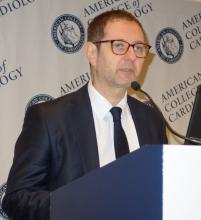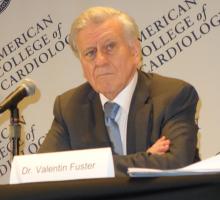ORLANDO – In what was hailed as a major advance in preventive cardiology, the ODYSSEY Outcomes trial has shown that adding the PCSK9 inhibitor alirocumab on top of intensive statin therapy reduced major adverse cardiovascular events and all-cause mortality significantly more than placebo plus intensive statin therapy in patients with a recent acute coronary syndrome and an elevated on-statin LDL cholesterol level.
The study findings suggest the key to improving outcomes in ACS patients is to drive their LDL cholesterol level below 50 mg/dL, P. Gabriel Steg, MD, said in presenting the results at the annual meeting of the American College of Cardiology.ODYSSEY Outcomes was a double-blind trial in which 18,924 patients at 1,315 sites in 57 countries were randomized to alirocumab (Praluent) or placebo plus background high-intensity statin therapy starting a median of 2.5 months after an acute coronary syndrome. All participants had to have a baseline LDL cholesterol level of 70 mg/dL or higher despite intensive statin therapy. Alirocumab was titrated to maintain a target LDL of 25-50 mg/dL. An LDL of 15-25 mg/dL was deemed acceptable, but if the level dropped below 15 mg/dL on two consecutive measurements the patient was blindly switched to placebo, as occurred in 7.7% of the alirocumab group.
The primary study endpoint was a composite outcome comprised of CHD (coronary heart disease) death, nonfatal MI, ischemic stroke, or unstable angina requiring hospitalization. During a median 2.8 years of follow-up, this outcome occurred in 9.5% of the overall population randomized to alirocumab and 11.1% of those on placebo, for a statistically significant and clinically meaningful 15% reduction in relative risk. The CHD death rates in the two study arms were similar; however, the other three components of the primary endpoint occurred significantly less often in the alirocumab group: The risk of nonfatal MI was 14% less (6.6% vs. 7.6%), ischemic stroke was 27% less (1.2 vs. 1.6%), and unstable angina was 39% less (0.4% vs. 0.6%).
All-cause mortality occurred in 3.5% of patients receiving alirocumab and 4.1% on placebo, once again for a statistically significant 15% reduction in risk. This was a major achievement, since even statins haven’t shown a mortality benefit in the post-ACS setting, observed Dr. Steg, cochair of the study.
The greatest benefits were seen in the 5,629 participants with a baseline LDL of 100 mg/dL or more on high-intensity statin therapy. In this large subgroup at highest baseline risk, alirocumab resulted in an absolute 3.4% risk reduction and a 24% reduction in relative risk of MACE. All-cause mortality decreased by an absolute 1.7%, translating to a 29% relative risk reduction. The number-needed-to-treat (NNT) for the duration of the study in order to prevent one additional MACE event in this group was 29, with an NNT to prevent one additional death of 60, added Dr. Steg, professor of cardiology at the University of Paris and chief of cardiology at Bichat Hospital.
“The risk/benefit for alirocumab is extraordinarily favorable. There was almost no risk over the course of the trial. There was no increase in neurocognitive disorders, new-onset or worsening diabetes, cataracts, or hemorrhagic stroke,” the cardiologist said.
Indeed, the sole adverse event that occurred more frequently in the alirocumab group was mild local injection site reactions, which occurred in 3.8% of the alirocumab group and 2.1% of controls.
There was a tendency for LDL to creep upward in both the alirocumab and placebo arms over the course of follow-up. Dr. Steg attributed this to down-titration or cessation of alirocumab as per protocol along with the inability of a substantial proportion of patients to tolerate intensive statin therapy. Most study participants had never been on a statin until their ACS.
A year ago at ACC 2017, other investigators presented the results of FOURIER, a large clinical outcomes trial of evolocumab (Repatha), another PCSK9 (proprotein convertase subtilisin/kexin type 9) inhibitor. FOURIER also showed a 15% relative risk reduction in major adverse cardiovascular events, but unlike in ODYSSEY Outcomes, there was no significant impact upon mortality. Dr. Steg attributed this to several key differences between the two trials.
The post-ACS population of ODYSSEY Outcomes was on average higher-risk than FOURIER participants, who had stable atherosclerotic cardiovascular disease. The background statin therapy was more intensive in ODYSSEY, and the average follow-up was close to 8 months longer, too.
Session cochair Valentin Fuster, MD, declared, “I believe this trial is going to change practice. It’s a hypothesis that has been fulfilled.”The study population is representative of an enormous number of patients seen in clinical practice, added Dr. Fuster, professor of medicine and physician-in-chief at Mount Sinai Hospital in New York. He estimated that one-third of patients who experience ACS can’t subsequently get their LDL down to the 70 mg/dL range on statin therapy, generally because of drug intolerance.
He voiced a concern: “Up until now, the feasibility and affordability of using this type of drug has been extremely difficult. I hope this particular study is a trigger – a catalyzer – for making this drug much more available to people who need it.”
Immediately after seeing the data, 62% of the audience said their practice will change as a result of the study findings.
ODYSSEY Outcomes was funded by Sanofi and Regeneron Pharmaceuticals. Dr. Steg reported serving as a consultant to and receiving research grants from those pharmaceutical companies and numerous others.
bjancin@frontlinemedcom.com
SOURCE: Steg GP.



